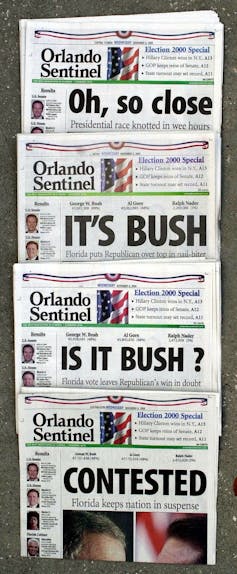Josh Gerstein for Politico:
A judge handling an election-fraud lawsuit brought by allies of President Donald Trump said the case was backed by “precious little proof,” but went on to issue a restraining order aimed at blocking three Georgia counties from making any changes to their voting machines as he considers whether to permit a forensic examination of those systems, according to court records.
U.S. District Court Judge Timothy Batten Sr. made the comments during an hour-long Sunday night court hearing on a lawsuit filed last week by Sidney Powell, a firebrand attorney who briefly joined Trump’s legal team in recent weeks before being dismissed from it.
The hearing was held via Zoom and not announced in advance on the court’s docket or accessible to the press or public, but it was transcribed by a court reporter who provided the transcript to POLITICO on Monday evening.
The transcript shows that Batten repeatedly wavered on whether to grant any relief to the Republican plaintiffs in the case, before settling on the narrow relief limited to three counties.
Powell and her colleagues initially wanted all voting machines in the state impounded pending further court action, but the state’s lawyers said that would present a slew of problems, including preventing some local elections set for this week and potentially interfering with the pair of U.S. Senate runoff elections set for Jan. 5.
“What the plaintiffs are seeking is basically going to take certain voting equipment out of the equation for the election scheduled to take place this Tuesday, as well as the election scheduled to take place on January 5th, because plaintiffs are wanting us to hold and basically mothball and preserve these machines at the county level — not in our possession, not in our custody and control,” Assistant Attorney General Russ Willard Sr. told Batten.
“In terms of a currently underway election, it is going to be throwing sugar in the gas tank and gumming up the works.”
Batten seemed open to the plaintiffs conducting what he called “a quick inspection” of the machines, with Powell initially asking to scrutinize the machines from 10 counties. She said “the bulk” of the inspections could be conducted within three days.
When called on by the judge, Powell aired her startling claim that the machines from Dominion Voting Systems were impacted by an algorithm that markedly increased votes for the Democratic presidential nominee, Joe Biden, and decreased them for Trump….
Powell also asserted that Dominion was doing the handiwork of late Venezuelan strongman Hugo Chavez. “It was conceived and created by Mr. Chavez’s regime for the very purpose of ensuring that he won future elections — as corrupt as it could possibly be,” she said.
Powell’s statements grew even more extreme on Monday, as she retweeted a Twitter message that called on Trump to declare an insurrection, halt the planned convening of the Electoral College in each state in Dec. 14 and use “military tribunals” to investigate alleged fraud related to the just-completed election.
